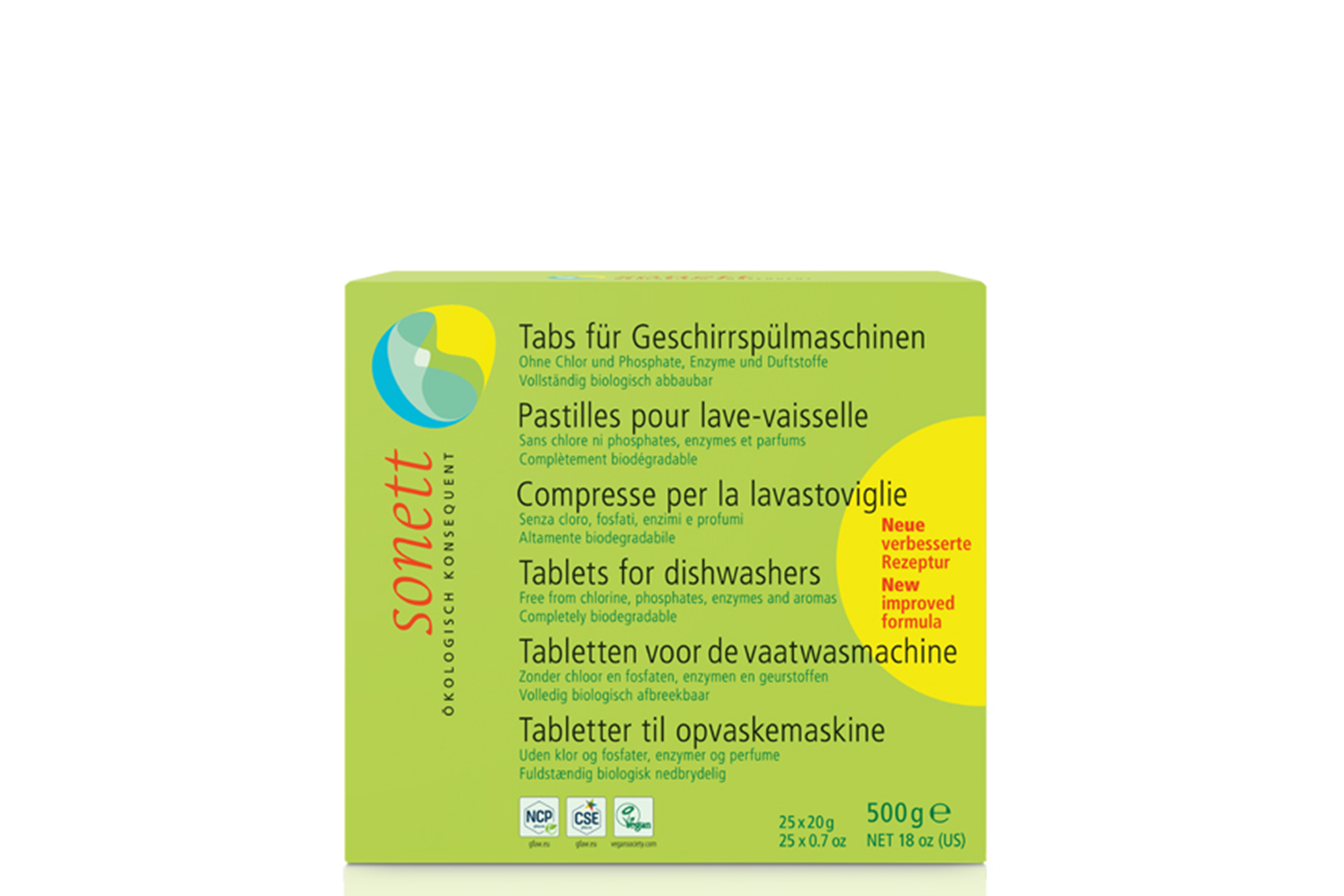Dishwasher Tablets 25x20g
Dishwasher Tablets 25x20g
Without chlorine and phosphates, enzymes and fragrances, completely biodegradable
NEW improved formula
For household dishwashers
Not suitable for silver, lead crystal and hand-painted porcelain
Further Information
Application
The Sonett tabs contain minerals and completely biodegradable organic components. They are made from 100% mineral and vegetable raw materials and contain no enzymes, no aggressive chlorine-based bleaches, no phosphates and no fragrances.
Scope of application
Suitable for all household dishwashers.
Only for dishwasher-safe dishes.
Not suitable for silver, lead crystal and hand-painted porcelain.
Dosage
Normally soiled dishes: 1 tab per wash cycle.
Heavily soiled dishes: 2 tabs per rinse cycle
Important to note:
Store tightly closed and dry. If possible, store the product between 10 and 25 °C.
Keep out of the reach of children.
For European Dishwashers, set the dishwasher softening system 8 °dH / 15 °fH higher than the actual water hardness. Please refer to the instructions for use of your dishwasher for instructions on how to do this.
Information about the dishwasher and setting the softening system >
The chambers for regenerating salt and rinse aid should always be filled and the dishwasher's fine filter must be cleaned regularly.
Danger
Causes serious eye irritation. If medical advice is required, have packaging or identification label available. Keep out of reach of children. Wear eye protection. If in eyes: Rinse gently with water for several minutes. If possible, remove any contact lenses. Continue rinsing.
Packaging
Tab film: PE
Cardboard: 100% recycled material
Outer box: 100% recycled material
Technical data
1 tab corresponds to approx. 20 g,
pH value: (20 °C, 5 g / l H₂O) approx. 10.5-11
Ingredients
Product declaration
Soda >30%
Citrate >30%
Sodium percarbonate 15–30%
Sorbitan Sesquioctanoate 1–5%
Sodium silicate 1–5%
Sodium gluconate 1–5%
Cellulose 1–5%
Balsamic additives, from controlled organic cultivation/wild collection <1%
List of ingredients according to EC 648/2004
Sodium Carbonate, Sodium Citrate, Sodium Percarbonate, Sorbitan Sesquioctanoate, Sodium Silicate, Sodium Gluconate, Cellulose
Origin and properties of the ingredients
The main active ingredients in the Sonett tabs for the dishwasher are soda, silicates and the plant-based, detergent substance sorbitan sesquioctanoate. Silicates are obtained by fusing sand with soda and, due to their alkalinity, are able to convert the fat on dishes through saponification and make them water-soluble. Adhering food residues are swollen and detached by these silicates. Soda, made from table salt and lime, distributes the fat into fine droplets and thus supports the fat-dissolving power of the silicates. The sorbitan sesquioctanoate, made from corn and wheat starch and a fat fraction of coconut oil, reduces the surface tension of the water so that the dirt on the dishes can be wetted better by the water .
The tabs also contain bleaching oxygen (sodium percarbonate). During the rinse cycle, sodium percarbonate releases oxygen along with water and soda. The oxygen released is used to remove tea and coffee residue from glasses and cups. Sodium percarbonate is an addition compound of hydrogen peroxide to soda (sodium carbonate).
Citrate, obtained from the fermentation of sugary by-products such as: B. Molasses, is added to the machine detergent to bind the lime in the washing water and protect the machine from deposits. Since many dishwashers still feed in too much lime-rich water despite the built-in ion exchanger (water softening system), the citrate is reinforced by the lime-binding power of sodium gluconate. Sodium gluconate is the salt of gluconic acids, which occur naturally in honey and fruits.
A small proportion of cellulose promotes the pressability and stability of the Sonett tabs.
Ecology
Biodegradation
Silicates and soda are mineral substances that do not need to be broken down further in nature. Citrate, a substance present in plants, animals and humans, is completely broken down in nature by the naturally present microorganisms in 2-3 days. Sodium percarbonate decomposes itself into mineral soda, water and oxygen during the washing and bleaching process and therefore leaves the dishwasher in a state that does not require any further degradation. I.e. The bleaching process is also the degradation process. According to the OECD, citrate, sodium gluconate and cellulose as purely plant-mineral substances are considered to be easily biodegradable.
Eco certification
NCP (Nature Care Product)
CSE (Certified Sustainable Economics)
Vegan Society
Have you tried?







